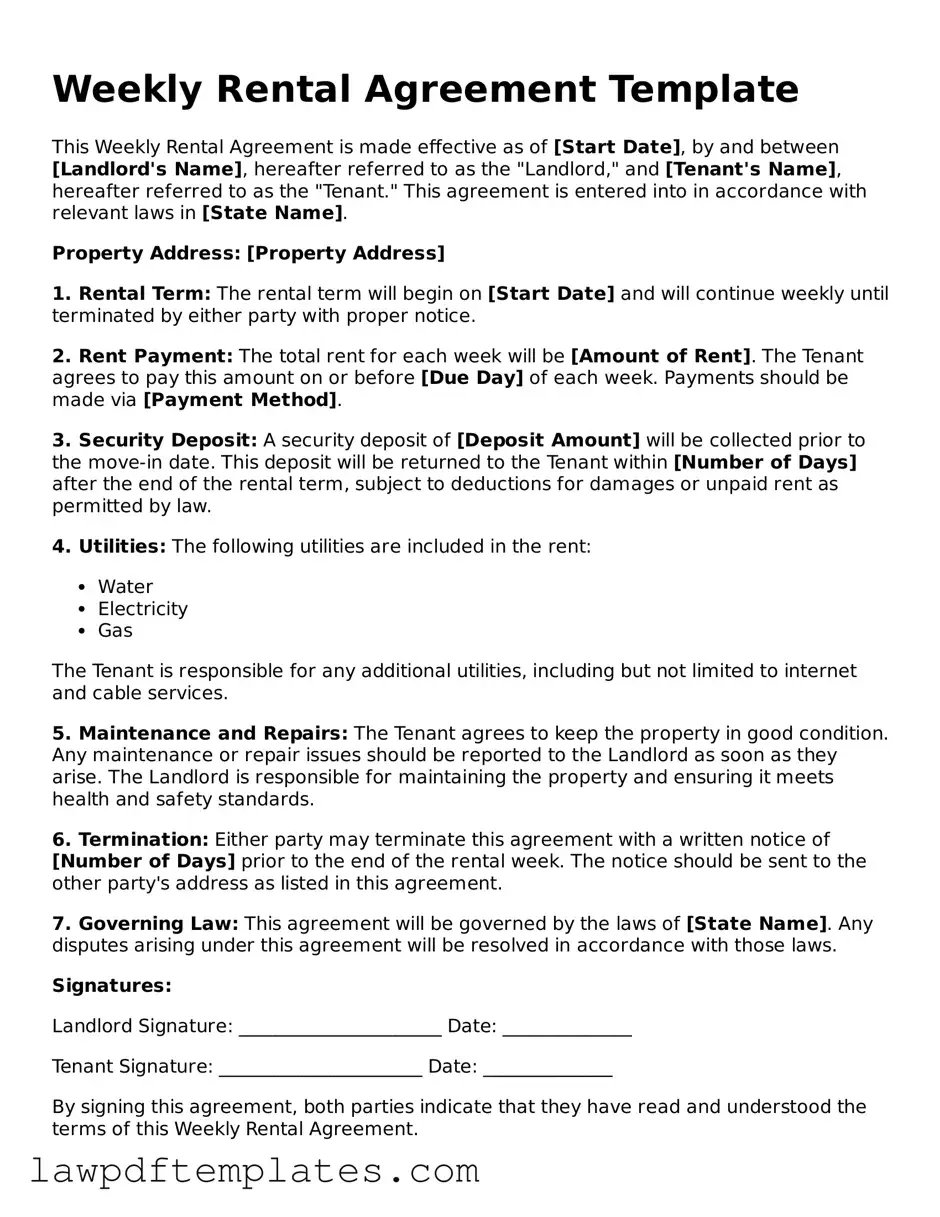Attorney-Approved Weekly Rental Agreement Document
Form Breakdown
| Fact Name | Description |
|---|---|
| Purpose | The Weekly Rental Agreement outlines the terms for renting a property on a weekly basis. |
| Parties Involved | The agreement is between the landlord and the tenant, each with specific rights and responsibilities. |
| Duration | This agreement typically covers a rental period of one week, with options for renewal. |
| Governing Law | In most states, the rental agreement is governed by state landlord-tenant laws. |
| Security Deposit | Landlords may require a security deposit, which is usually refundable at the end of the rental period. |
| Payment Terms | The agreement specifies the rental amount due and the method of payment. |
| Property Maintenance | Responsibilities for property maintenance and repairs are outlined for both parties. |
| Termination Clause | Conditions under which either party can terminate the agreement are clearly stated. |
| State-Specific Forms | Some states may have specific forms or additional requirements that must be met. |
| Signatures | The agreement must be signed by both parties to be legally binding. |
Sample - Weekly Rental Agreement Form
Weekly Rental Agreement Template
This Weekly Rental Agreement is made effective as of [Start Date], by and between [Landlord's Name], hereafter referred to as the "Landlord," and [Tenant's Name], hereafter referred to as the "Tenant." This agreement is entered into in accordance with relevant laws in [State Name].
Property Address: [Property Address]
1. Rental Term: The rental term will begin on [Start Date] and will continue weekly until terminated by either party with proper notice.
2. Rent Payment: The total rent for each week will be [Amount of Rent]. The Tenant agrees to pay this amount on or before [Due Day] of each week. Payments should be made via [Payment Method].
3. Security Deposit: A security deposit of [Deposit Amount] will be collected prior to the move-in date. This deposit will be returned to the Tenant within [Number of Days] after the end of the rental term, subject to deductions for damages or unpaid rent as permitted by law.
4. Utilities: The following utilities are included in the rent:
- Water
- Electricity
- Gas
The Tenant is responsible for any additional utilities, including but not limited to internet and cable services.
5. Maintenance and Repairs: The Tenant agrees to keep the property in good condition. Any maintenance or repair issues should be reported to the Landlord as soon as they arise. The Landlord is responsible for maintaining the property and ensuring it meets health and safety standards.
6. Termination: Either party may terminate this agreement with a written notice of [Number of Days] prior to the end of the rental week. The notice should be sent to the other party's address as listed in this agreement.
7. Governing Law: This agreement will be governed by the laws of [State Name]. Any disputes arising under this agreement will be resolved in accordance with those laws.
Signatures:
Landlord Signature: ______________________ Date: ______________
Tenant Signature: ______________________ Date: ______________
By signing this agreement, both parties indicate that they have read and understood the terms of this Weekly Rental Agreement.
Common mistakes
When filling out a Weekly Rental Agreement form, many individuals overlook crucial details that can lead to misunderstandings or disputes later on. One common mistake is failing to provide accurate personal information. This includes names, addresses, and contact numbers. Incorrect information can complicate communication and hinder the ability to resolve issues that may arise during the rental period.
Another frequent error is neglecting to read the terms and conditions thoroughly. Renters often skim through the document, missing important clauses related to deposits, maintenance responsibilities, or penalties for late payments. Understanding these terms is essential for both parties to ensure a smooth rental experience.
Additionally, people often forget to specify the rental duration clearly. A vague rental period can lead to confusion about when the lease begins and ends. This lack of clarity may result in disputes over payment or the return of the property, creating unnecessary tension between landlords and tenants.
Many individuals also overlook the importance of documenting the condition of the property before moving in. Failing to note existing damages can result in unfair charges when the rental period ends. Taking photos or writing a detailed description can protect renters from being held liable for pre-existing issues.
Another mistake involves not discussing or understanding the payment terms. Renters may assume the payment schedule is flexible or that certain fees are included without confirming these details with the landlord. This assumption can lead to financial strain and unexpected costs.
Lastly, some renters forget to ask about the rules regarding guests or pets. Each property may have specific regulations that need to be followed. Not clarifying these rules upfront can lead to violations, which might result in penalties or even eviction.
Consider Popular Types of Weekly Rental Agreement Documents
Breaking Lease Letter - A formal notice used by tenants to end a lease agreement.
Lease Garage - The form can help ensure compliance with homeowners' associations, if applicable.
When drafting a Lease Agreement form, it's crucial to have access to comprehensive resources, such as those provided by Fast PDF Templates, which can guide landlords and tenants in creating an effective document that outlines their mutual obligations and ensures a transparent rental relationship.
Does Word Have a Rental Agreement Template? - This agreement may include information about facility security measures.
